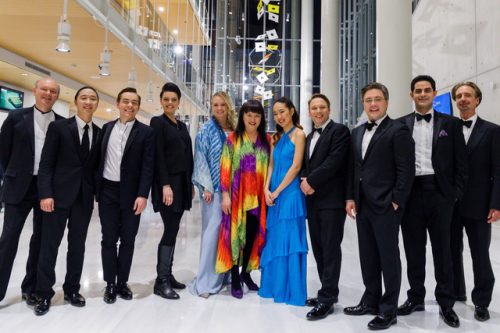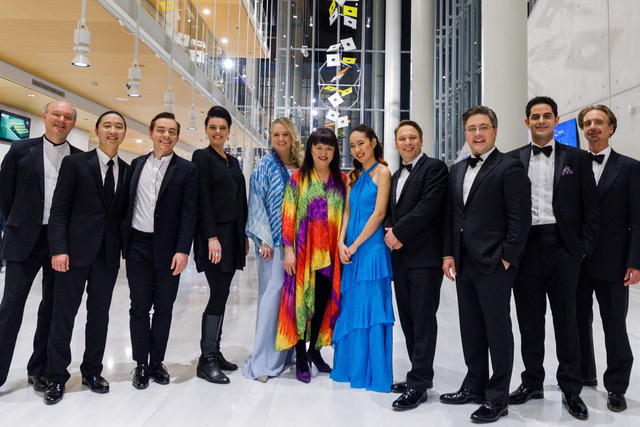 Greece Various composers, Live from Lincoln Center – Odyssey: The Chamber Music Society in Greece: Chamber Music Society of Lincoln Center, Broadcast by PBS, New York, 6.9.2019. (RP)
Greece Various composers, Live from Lincoln Center – Odyssey: The Chamber Music Society in Greece: Chamber Music Society of Lincoln Center, Broadcast by PBS, New York, 6.9.2019. (RP)

© Da-Hong Seetoo
Bach – Violin Sonata No.2 in A minor BWV1003, Andante
Beethoven – Serenade in D major for Flute, Violin and Viola Op.25
Debussy – Syrinx
Ravel – Selections from Cinq mélodies populaires grecques
Tsontakis – Selections from KnickKnacks
Mendelssohn – Octet in E-flat major Op.20
Out-of-the-box is a term that generally makes me cringe, but I will happily embrace it to describe The Chamber Music Society of Lincoln Center’s start to its fiftieth anniversary season. Eschewing a glittery gala concert and fundraising in the guise of an extravagantly expensive, star-studded dinner, it opted instead for a musical experience that anyone can enjoy for free on PBS. Recorded in Greek locations that span the ancient to the modern, ‘Odyssey: The Chamber Music Society in Greece’ is equal parts music, travelogue and philosophical discourse.
Alone in the ruins of the First Ancient Theatre of Larissa, violinist Aaron Boyd played the Andante from Bach’s Violin Sonata No.2 with scrupulous musicianship, especially his incisive articulation. The amphitheater was built during the early third century BCE. Originally the scene of Dionysian rites, it was later converted to a Roman-style arena where animal fights, gladiatorial combats and other popular entertainments were held until it was destroyed by an earthquake in seventh century CE. Those ancient stones have probably never resounded with such majestic music.
On the Magnesia Peninsula in Thessaly, the Church of the Monastery of Pammegiston Taxiarchon with its Byzantine gilt and red interior adorned by icons and chandeliers was where Boyd was joined by violist Paul Neubauer and flutist Tara Helen O’Connor in Beethoven’s Serenade in D major. The church is on Mount Pelion where, according to myth, the Centaurs, the half-human, half-horse creatures, abided. Beethoven was no stranger to myth and heroism, but the Serenade finds him lighthearted and gay, qualities that the three players captured in a particularly high-spirited performance of this captivating work.
The foray into twenty-first-century Greek architecture was just outside of Athens at the Stavros Niarchos Cultural Centre. Designed by Renzo Piano, the Centre was gifted to Greece by the Stavros Niarchos Foundation in 2017. On its stage, mezzo-soprano Emily D’Angelo and pianist Wu Han performed four of Ravel’s Cinq mélodies populaires grecques. Still in her mid-twenties, D’Angelo has a rich tone that impresses with its dark timber and exceptional communicative powers. At the piano, Wu Han played with equal focus, vitality and intensity.
The Centre also was the venue for a performance of Mendelssohn’s Octet in E-flat major, composed when he was sixteen, by violinists Aaron Sean Lee, Arnaud Sussmann and Danbi Um, violist Matthew Lipman and cellists Dmitri Atapine and David Finckel, as well as Boyd and Neubauer. In introducing the work, Finckel compared the sixteen-year-old Mendelssohn, enthralled with his own powers, to a young Greek god hurling lightning bolts from his hands. The eight musicians’ playing of the Mendelssohn was far less explosive but equally electrifying. Especially beautiful was the lyrical Andante, performed with exceptional delicacy and sensitivity.
In KnickKnacks, the Greek-American composer George Tsontakis evokes the lyra and lute, instruments central to the traditional music of Crete, in his writing for the violin and viola. The performance took place in the imposing Cathedral of Saints Constantine and Helen in Volos. It was an apt pairing of music and place: Volos is where Jason boarded the Argo to begin his quest for the Golden Fleece, and Tsontakis’ music is equally bold and adventuresome. Boyd and Neubauer captured its frenetic energy (the composer termed it obsessive), but much more satisfying was how they revealed the work’s innate beauty and intricate structure.
The most evocative work, however, was Debussy’s Syrinx for solo flute performed by O’Connor in Larissa’s ancient theater. The short piece captures the moment that the lusty satyr Pan begins to play his pipes, which he made from the water reeds into which the chaste water nymph Syrinx had transformed herself to escape his amorous advances. The purity, poignancy and beauty of the music evoked the history of the ancient ruins, and indeed Greece, as no other work on the program had.
Rick Perdian
Lincoln Center Live – ‘Odyssey: The Chamber Music Society in Greece’ can be viewed click here.
